<< Return to previous Events
Political Development in Jordan and the challenges facing the region
15th October 2013
House of Lords
Political reform has been a live issue in Jordan for several years, with His Majesty King Abdullah making it a stated priority for successive Governments.
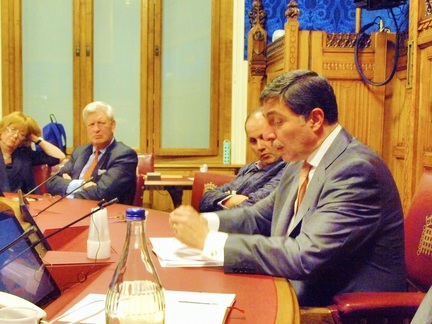
His Excellency the Ambassador used his talk to outline progress in recent years, along with his assessment of the challenges facing the Middle East at the moment. The Centre for Opposition Studies has been focussing on the issue of political reform and good governance in a number of countries in the Middle East and North Africa, and last year ran a project funded by the UK Foreign Office on the challenges of stability and opposition in Jordan.
We are grateful to Baroness Morris of Bolton for hosting and Chairing the meeting.
Speaker: His Excellency Mr Mazen Homoud, Jordanian Ambassador to the UK
The Ambassador began his career at the Foreign Ministry as a diplomat at Jordan’s Permanent Mission to the United Nations in New York. For eleven years, he worked at the Court of His Majesty the late King Hussein and afterwards at the Court of His Majesty King Abdullah II. He later held positions at the Jordan Investment Board and was Managing Director of the Jordan Tourism Board.
Since assuming his position as Ambassador of Jordan to the Court of St. James’s in 2011, His Excellency has taken a special interest in working with the UK parliament on many issues of mutual concern, and has arranged for a number of UK parliamentary delegations to visit Jordan.
Issues Confronting Women in Iran, and the Prospects for Change
14th May 2013, House of Lords
Whilst human rights in the Islamic Republic of Iran are restricted for all its citizens, it is too often women who are worst affected, suffering widespread abuse and systematic oppression by the regime. As part of our series looking at the internal politics of Iran in the run-up to the Presidential election, we were pleased to present this panel discussion focusing on the situation and role of women. Our speakers were two leading Iranian human rights activists, who addressed in detail the many aspects of this difficult issue.
This was the latest in a series of discussions the Centre for Opposition Studies has held in association with Kayhan (London) and was chaired by Nazenin Ansari, Kayhan’s Managing Editor. It follows on from our previous meetings with Iranian journalists, commentators and campaigners for democracy.
Speaker: Roya Kashefi
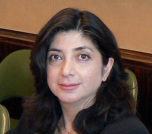 Roya Kashefi is the head of the human rights committee of the Association of Iranian Researchers (ACI), an international non-profit organisation dedicated to unbiased and objective study of Iranian issues. She is also a founding member of two non-profit women’s organisations: the International Coalition Against Violence in Iran (ICAVI); and MDG3 (Millennium Development Goal 3), a coalition of several international women’s rights NGOs dedicated to the social and political participation of women; Her book ‘Violence isn't just physical’ - a study of the Islamic Republic’s laws and their effect on the lives of women in Iran- will be published later this year.
Roya Kashefi is the head of the human rights committee of the Association of Iranian Researchers (ACI), an international non-profit organisation dedicated to unbiased and objective study of Iranian issues. She is also a founding member of two non-profit women’s organisations: the International Coalition Against Violence in Iran (ICAVI); and MDG3 (Millennium Development Goal 3), a coalition of several international women’s rights NGOs dedicated to the social and political participation of women; Her book ‘Violence isn't just physical’ - a study of the Islamic Republic’s laws and their effect on the lives of women in Iran- will be published later this year.
Speaker: Shadi Sadr
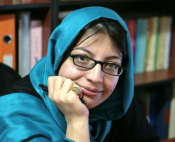 Shadi Sadr is an Iranian lawyer, human rights activist and journalist. She has risked her life campaigning for the human rights of women and journalists inside Iran, where she has been arrested, beaten and imprisoned. Ms. Sadr is the founder and director of Raahi, a legal centre for women that was closed down by the Iranian authorities in 2007. She has received several awards, including the Ida B Wells award for bravery in journalism, and the US State Department’s International Women of Courage Award. In July 2010 she established a new organisation called Justice for Iran, to promote and defend women's rights in the increasingly discriminatory and fundamentalist environment in Iran.
Shadi Sadr is an Iranian lawyer, human rights activist and journalist. She has risked her life campaigning for the human rights of women and journalists inside Iran, where she has been arrested, beaten and imprisoned. Ms. Sadr is the founder and director of Raahi, a legal centre for women that was closed down by the Iranian authorities in 2007. She has received several awards, including the Ida B Wells award for bravery in journalism, and the US State Department’s International Women of Courage Award. In July 2010 she established a new organisation called Justice for Iran, to promote and defend women's rights in the increasingly discriminatory and fundamentalist environment in Iran.
Let's Hear it for the Losers! How strong opposition assists good government
23rd January 2013,
House of Lords
It was the 19th Century British Prime Minister Benjamin Disraeli who famously observed that “No government can long be secure without a formidable opposition”. In this lecture, Peter Kellner, the leading political commentator and President of the YouGov polling company, offered his thoughts on that proposition.
Many politicians and commentators dismiss opposition as a time of frustration, to be endured and escaped from as soon as possible. Even when we take opposition seriously, it is usually only in the context of their prospects of becoming the next government. But there is an important role for the opposition in the here and now: Scrutinising ministers and holding the government to account. How well they do that job can have a significant effect.
The event was kindly sponsored by Baroness Royall of Blaisdon.
Speaker: Peter Kellner
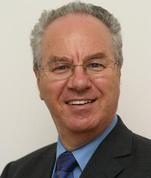 Peter Kellnerwas previously a journalist and political commentator for more than 30 years, for the Sunday Times, Independent, New Statesman, Evening Standard, BBC Newsnight, BBC election programmes and Channel Four News.
Peter Kellnerwas previously a journalist and political commentator for more than 30 years, for the Sunday Times, Independent, New Statesman, Evening Standard, BBC Newsnight, BBC election programmes and Channel Four News.
He has been an adviser on polls and public opinion to the Bank of England, Foreign Office, Corporation of London, National Westminster Bank plc. and Trades Union Congress. He has an MA in Economics and Statistics from Cambridge University. Peter is a member of the British Polling Council's committee on disclosure, and wrote the Journalists' Guide to Opinion Polls for the European Society for Opinion and Marketing Research.
He is a regular speaker at industry conferences and seminars, and in 2011 was given a Special Recognition award by the Political Studies Association for his work over four decades on opinion polls, elections and political analysis.
Prince Reza Pahlavi: ‘The Path to Secularism and Democracy in Iran’
16th January 2013, House of Lords
Continuing our series of events looking at Opposition to the current regime in Iran in advance of the Presidential elections later this year, we were pleased to host Prince Reza Pahlavi, son of the late Shah of Iran.
As Crown Prince of Iran at the time of the 1979 Islamic Revolution, Prince Reza has been in exile from his homeland since then, but has used his high public profile to campaign for democracy and human rights in the years since.
In his talk, he outlined his vision for opposition groups to work together to achieve change in Iran, launching the blueprint for a National Council, to which he invited other like-minded Iranians to contribute.
The full text of his opening address is available here.
We are grateful to Baroness Morris of Bolton for hosting the event, which was Chaired by Nazenin Ansari, Managing Editor of Kayhan (London).
Political Opposition in Iran: Challenges and Opportunities
15th January 2013, House of Commons
As international attention on Iran continues to focus on the issue of its nuclear programme, the importance of the country’s internal politics should not be ignored.
With Presidential elections due in June 2013 to choose Mahmoud Ahmadinejad's successor and memories of the ‘Green movement’ reaction to the 2009 result being reawakened, leading Iranian journalist and commentator Amir Taheri gave a talk examining the position of opposition voices in Iran, and offering his thoughts on their future.
He suggested that Iranian history has seen the country alternate between nationalistic and religious discourse, neither of which has offered the answers people have sought. The current religious discourse was fading, he argued, but there was a need for Iran's opposition groups to offer something new in its place.
This meeting was kindly sponsored by Philip Lee MP
Speaker: Amir Taheri
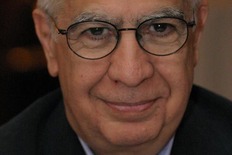 Amir Taheri, named as Best International Journalist of the Year by the British Press Awards in 2012, is a columnist for a number of international newspapers including The Times, The Wall Street Journal, The International Herald Tribune and the pan Arab daily newspaper Asharq Al-Awsat.
Amir Taheri, named as Best International Journalist of the Year by the British Press Awards in 2012, is a columnist for a number of international newspapers including The Times, The Wall Street Journal, The International Herald Tribune and the pan Arab daily newspaper Asharq Al-Awsat.
He has published 11 books on Islam, Iran, the Soviet Union, and the Middle East. His book on Saudi Arabia, entitled “The Kingdom of Allah”, is due for publication in 2013. Mr Taheri was a member of the Executive Board of the International Press Institute (IPI) for eight years and a campaigner for press freedom across the globe. He also served on the Executive Board of the Reporters Without Borders for three years. He has been a Senior Fellow at the National Committee for American Foreign Policy (NCAFP) since 2002 and Director of its Middle East Project.